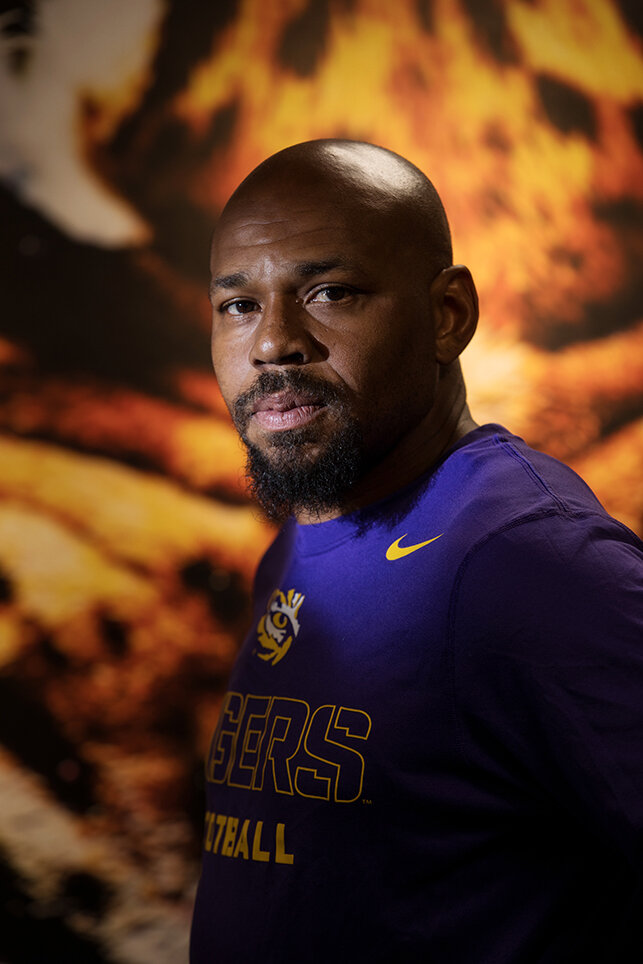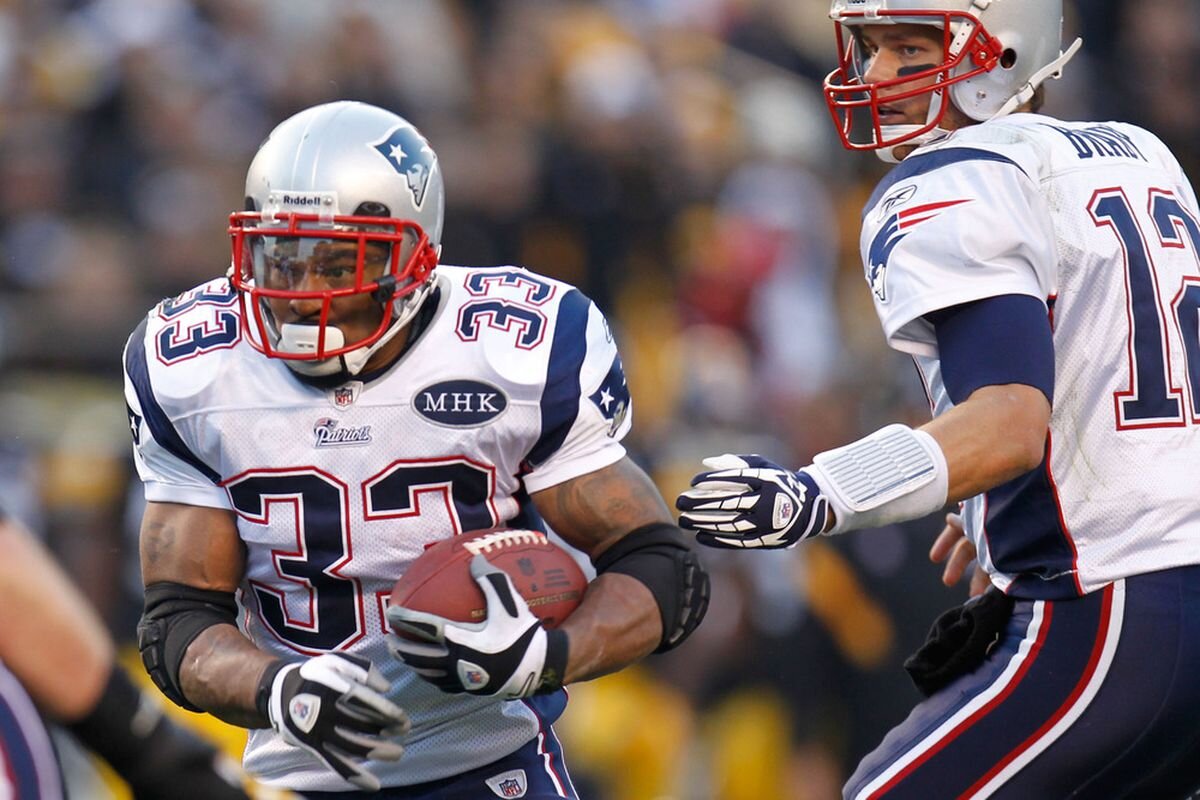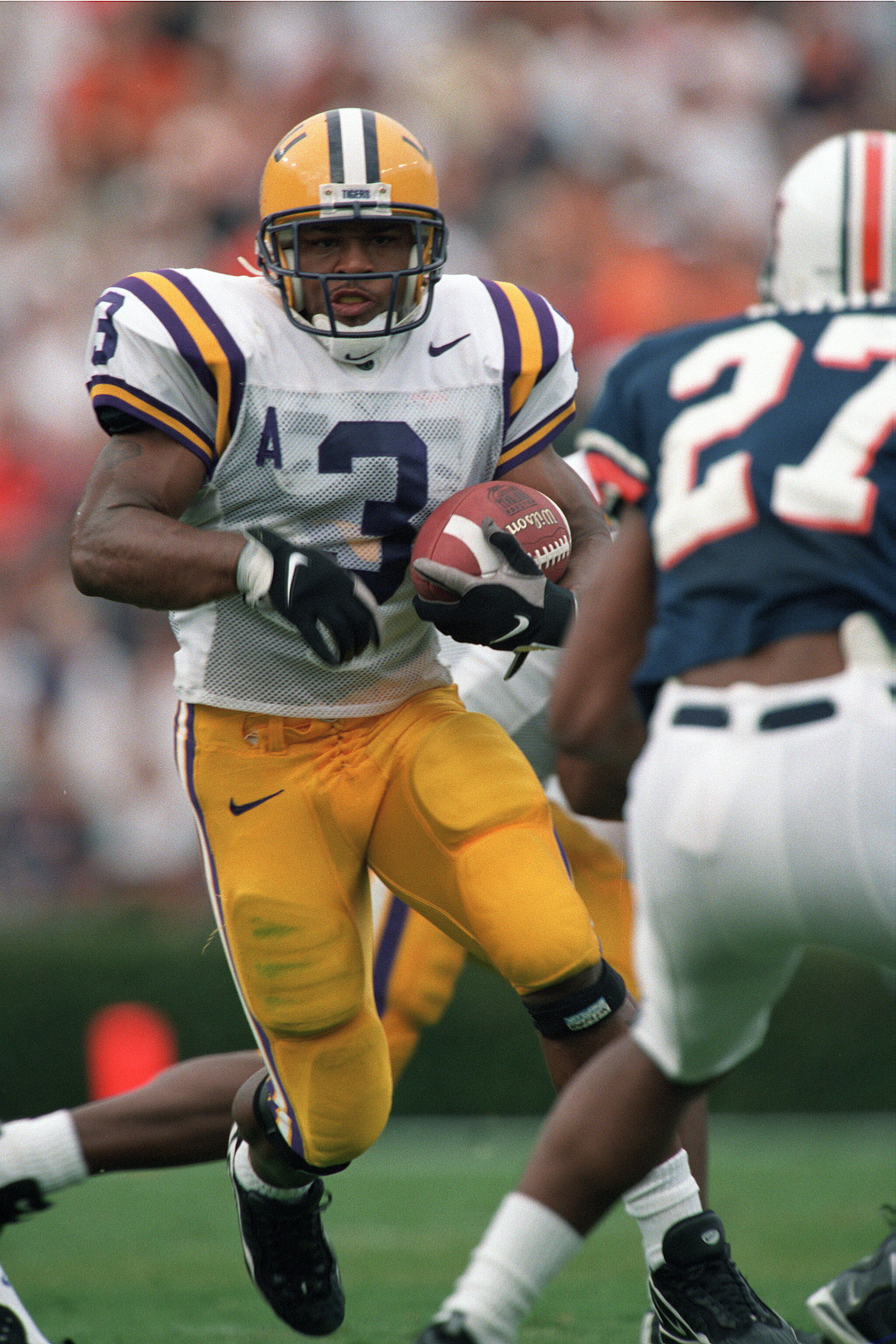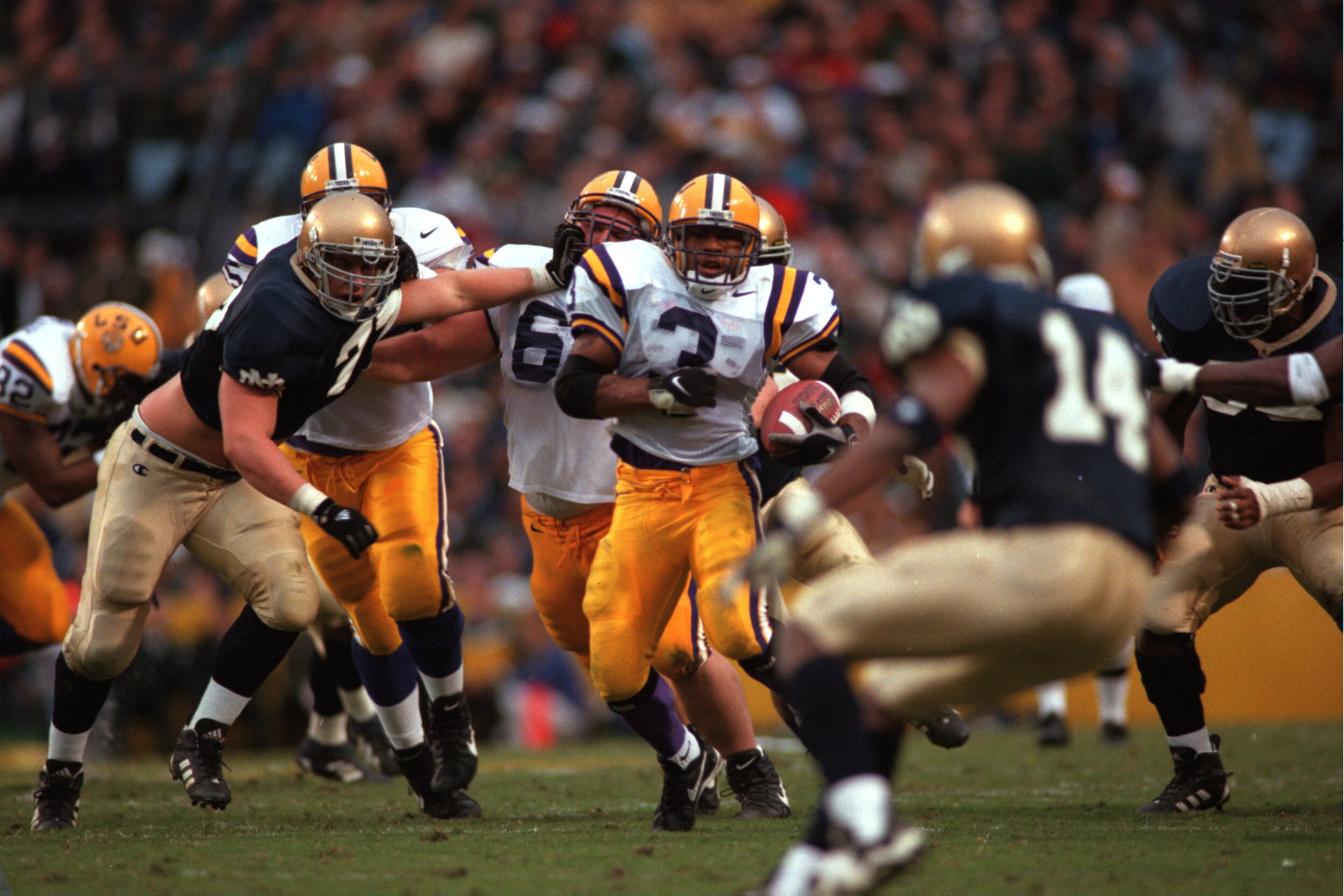Kevin Faulk: Louisiana Born and Bred
Photo: 225 Magazine
Selfish is not in his vocabulary, and his ability to focus on the bigger picture has always been the most prominent.
Although he is someone with remarkable accolades and accomplishments, Kevin Faulk’s most valuable achievements come from connection with others and personal feats that were often overlooked.
Young Kevin Faulk was a baseball player for six years prior to his discovery of football. The competitiveness and physicality of the game drew him away from the diamond, as baseball was becoming too boring. Years later, Faulk found himself entering a program that had six straight losing seasons. His focus was not on his own personal goals, but instead on ensuring that he and the other players in his recruiting class could be the ones to turn the program around.
Faulk getting some BP before LSU’s spring football’s Home Run Derby
Faulk played football for LSU from 1995-1998, where he was named a 1996 first team All-American. He remains LSU’s all-time leader in rushing yards (4,557) and rushing touchdowns (46). Faulk finished his LSU career as the SEC’s all-time leader in all-purpose yards with 6,833.
In Faulk’s eyes, these records have stood for far too long.
“They’re getting old; it’s time for somebody to break them. Records are meant to be broken, and it’s done by very special people,” Faulk said.
LSU had three bowl game appearances throughout Faulk’s career, and he thanks his teammates for giving him his best memories as an LSU Tiger.
“Like they always say, some of your best friends in the world are gonna come from college,” Faulk said. He remains best friends with some of his LSU teammates, and is eternally grateful for the comradery he found through the team.
Faulk went on to play for the New England Patriots for 13 seasons after being drafted in the second round of the 1999 NFL Draft. A native of Carencro, Louisiana, Faulk did not even know where New England was until he visited.
“When I first saw the facilities, I was like, ‘can I go back to college?’ But, over time, we grew to love it, both me and my family,” Faulk said.
Despite the SEC being one of the best conferences for NFL preparation, Faulk was forced to adjust to the speed of the game upon his transition from college football to the professional game.
“Like anything else in life, you have to adjust to it. Take it day by day with a grain of salt, and do things for a purpose. It was work, but I was doing something I loved to do,” Faulk said.
Throughout his time with the Patriots, Faulk made five Super Bowl appearances, winning three titles in 2001, 2003 and 2004. He holds the franchise record for all-purpose yards (12,349) and kickoff return yards (4,098). Faulk is the Patriots’ all-time leading return specialist with 5,041 combined return yards, as well as their all-time leader in receptions by a running-back. His illustrious career as a Patriot earned him the title of one of the most productive players in franchise history.
Faulk credits his coach, Bill Belichick, with Faulk’s ability to grow so much as a player and individual. He considers Belichick to be one of the best coaches to coach football at the NFL level.
“Getting to understand the game of football through his eyes, and through my eyes, but with his guidance, that was it,” Faulk said.
Although some of his achievements as a Patriot were individual, Faulk gives all of the credit to his team’s ability to be selfless and work toward a common goal for helping him reach the elite level he did. And, similar to his LSU guys, his Patriots’ teammates left a lasting impact on him as well.
“Everybody was playing for everybody. Everyone had an understanding of what their role was, and were working together to get that done,” Faulk said. “Just winning helped a whole lot. Playing with a lot of good guys helped a lot. I met a lot of guys I stayed close to and we’ve been retired for a while now.”
Faulk retired from football in 2011, with countless accolades following his name. He is a member of the Louisiana Sports Hall of Fame, the LSU Athletic Hall of Fame, the Patriots Hall of Fame, New England’s All-Decade team of the 2000s and the 50th Anniversary Team. Although these achievements are highly significant, Faulk does not consider any of them to be the most meaningful to him. Instead, graduating college with a degree in kinesiology is the feat he is most proud of.
“A lot of people would go with the accolades and the awards; most people don’t think about school. They go to college to play ball. I didn’t know I was going to play that long in the NFL, but I knew I wanted to finish school. That was one of my deciding factors,” Faulk said.
After Faulk retired, he worked in radio and television before he got a call from his high school alma mater, Carencro High School. He had been offered an assistant coaching position for their football team.
“It came back full circle. If I hadn’t graduated from college, I would have had to go back to school and then coach later. Since I graduated earlier, I could start right away,” Faulk said.
Faulk’s primary motivation for coaching came from the relationship he built with his middle school and high school football coaches. His middle school coach was the “disciplinarian,” who also served as a mentor, therapist, counselor, step-dad, all of the above. Faulk would also work for his coaches in the summer, being an example of a leader and a mentor for younger boys. He thanks his coaches for teaching him hard work both on and off the field. Since he was so heavily impacted by his own coaches, Faulk knew he wanted to do the same for others in his future.
“They were everything to us. It wasn’t just me; it was a lot of other kids that went to school with us. I wanted to be that guy. I wanted to be the one to push a kid forward,” Faulk said.
Faulk continued his pursuit of leading young athletes to successful careers when he became the Director of Player Development at LSU in 2018. He worked with LSU student-athletes on their academic direction, social development and overall quality of life. Although the role was more than he originally expected, Faulk loved the work he was able to do.
“I loved it. I got a chance to get deeper with the kids. I could go into classes and study hall, and also take them places. It was more personal,” Faulk said.
After two years as the Director of Player Development, Faulk was offered a spot on LSU Football’s staff as the running backs coach, following their 2019 National Championship season. Upon accepting this job, Faulk became the first Super Bowl champion out of LSU to become an LSU Football coach. He also joined two other LSU Football alumni on the full-time coaching staff: former quarterback Steve Ensminger and former cornerback Corey Raymond.
Faulk loves coaching, but even his student-athletes miss the intimacy they had with him in his former role.
“When I got into the role as the running backs coach, they said they loved having me as a coach, but missed having me on the outside. They missed the little things,” Faulk said.
Even with a resume as impressive as Faulk’s, he still feels the pressure behind his name and what he has accomplished.
“Still to this day, every day it’s like, walking in the meeting room, and seeing your picture in there. Very humbling. Kind of like I was telling my guys the other day, they don’t understand the pressure that comes with that now. It may not be pressure that comes from anybody else but me. I gotta see that every day,” Faulk said.
With the pressure felt, Faulk has a clear idea of how he wants to be remembered as both an athlete and a coach. As an athlete, he hopes people remember him for being extremely competitive, always giving it everything he had, and always doing everything he could for the football team he played on.
As a coach, all Faulk can ask for is this: “I want my athletes to feel about me the way I felt about my coaches,” he said.
As one of the most beloved and influential individuals to come through LSU, Faulk takes his favorite piece of advice to heart, and treats others the way he wants to be treated. He also advises struggling student-athletes to stay within their own parameters, and as long as they understand who they are, they will be fine.
Faulk means the world to LSU, but LSU may mean more to him. For Faulk, LSU is everything.
“Everything. Home. Family. You have people that have worked here for 20 years, and are still here whenever you come back. It’s the tradition, the history, the fans, the state, I could go on and on. No matter how many years you’re away, that field is still there when you get there and when you come back.”









